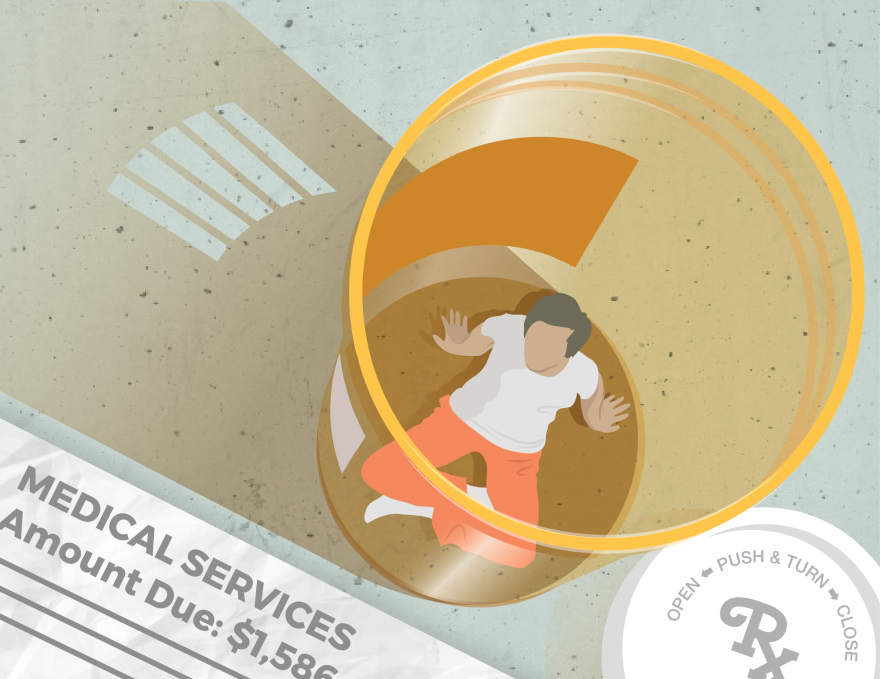This article is a collaboration between St. Louis Public Radio and the Belleville News-Democrat.
Jolene Baker’s knees ached with arthritis, she suffered from high blood pressure, and she needed medication for frequent migraines.
The East St. Louis resident’s employer-sponsored health insurance covered less and became more expensive every year she worked at the fast-food seafood restaurant. The 56-year-old’s untreated health problems made it almost impossible to work on her feet all day.
“I was weak. I was sluggish,” Baker said.
She had to quit to find more suitable part-time work, and she lost her health insurance.
In between jobs, Baker turned to the Marketplace, the online health insurance exchange opened in 2010 as part of theAffordable Care Act. For $40 a month, she got access to the regular treatment and medication she needed to get back on her feet within a year. She now works full time as a home health care professional and has insurance through her employer.
While the ACA worked in Baker’s favor, two southern Illinois Republican congressmen up for reelection on Nov. 3 say Americans deserve a better plan. Their Democratic challengers say the GOP has abandoned those in need of affordable health insurance.
In an election year when COVID-19 pandemic highlights the urgent need for health care, candidates' position on the ACA could make or break them.
Roughly 20 million Americans use the ACA to find and buy health insurance, including nearly 293,000 Illinoisans in 2020. But the law did more than create a website where people can shop for plans. It allows uninsured low-income adults to receive coverage under an expanded Medicaid, protects people with preexisting conditions, guarantees preventative care, extends parents’ insurance to adult children and requires large employers to provide health insurance.
Republicans, who call it Obamacare, have tried to repeal the law since its passage in 2010 and have promised a new, improved plan since then, though they’ve never delivered on either.
Voters will have to decide whether they trust Republican lawmakers to come up with a replacement for the ACA, or if it’s safer to elect Democrats who have vowed to protect and improve the existing act.
At least 15,400 people in thesouthern Illinois 12th Congressional District represented by Rep. Mike Bost, R-Murphysboro, are enrolled in the ACA. Nearly 20,000 use the Marketplace to buy insurance in the 13th Congressional District represented by Rep. Rodney Davis, R-Taylorville, according to a BND/St. Louis Public Radio analysis of federal data.
ACA enrollees by zip code in the 12th and 13th Congressional Districts in 2020
Credit: Dave Rench McCauley/DataKind and National Press Foundation
Both incumbents say the options on the Marketplace are too expensive, leaving millions of Americans either without health care coverage or with plans they cannot use.
“They’re not signing up, or they’re scraping by,” Davis said. “But if they’re diagnosed in those high deductibles … they can’t meet them. They can’t get the health care they deserve.”
For those most in need, the ACA is their only option, the Democrats challenging the GOP congressmen say. They point to the Republicans’ record of voting toscrap or weaken health care under the ACA.
Democrat Betsy Dirksen Londrigan ran on health care in her nearly successful 2018 campaign to unseat Davis, and she'sfocused on it again in their 2020 rematch.
“I got back in in 2020 because people still need help,” Dirksen Londrigan said. “I got into the race to protect health care. It’s what motivated me to run in the first place.”
To the south, Bost says Republicans could pass a better plan that protects rights for those with preexisting conditions once the “hyper sensitive” political environment of the election passes. His challenger, Democrat Raymond Lenzi of Makanda, says Republicans have no plan.
“There is no replacement. ... This is the hoax of the Republican Party, of Donald Trump and Mike Bost on health care,” Lenzi said.
Though she’s covered now by her employer’s insurance plan, Baker worries she might not have another option in the future if her health fails again. President Donald Trump told CBS News’ "60 Minutes" last week he hopes theU.S. Supreme Court throws out the entire ACA in an upcoming case, while Republicans have yet to lay out a replacement plan.

Baker, who lives in Bost’s district, voted for his Democratic opponent. But she still worries about the future of American health care and whether either Democrats or Republicans can deliver improvements or a better plan.
“People can say anything and tell you what you want to hear, but when you get in office, it’s a totally different thing,” Baker said. “You can tell me anything, but you have to show me.”
Davis and Bost voting history
A favorite refrain of Democratic candidates is to point out howBost and Davis have voted to repeal the ACA multiple times, while the congressmen say they have always protected the most popular portions of the act, like protections for preexisting conditions.
Dirksen Londrigan says Davis, a 50-year-old four-term congressman, voted 11 times to repeal the ACA. He argued in debates this year that those votes were “procedural,” that is, the votes were symbolic expressions of Republicans’ opposition to portions of the law but did not have any legally binding effect.
From 2013 through 2017, Davis voted at least seven times on nonbinding budget measures that called for repealing and replacing the ACA but had no effect on the law. Republicans did not present an alternative until 2017.
Davis also voted for bills in 2013 and 2015 that would have repealed the ACA in full. The 2013 bill offered no alternative plan, while the 2015 bill called on four congressional committees to draft future legislation that would offer alternatives to the ACA.
And he voted to override a 2016 veto by former President Barack Obama of a budget measure to repeal portions of the ACA.
“We still have (millions of) Americans who can go online and look all they want at the Affordable Care Act options but can’t afford them,” Davis said.
Davis says he has never supported removing coverage for preexisting conditions despite symbolic votes, while Dirksen Londrigan says they represent a real desire to repeal the ACA in full.
Dirksen Londrigan, a 49-year-old self-employed nonprofit adviser, says Davis has “celebrated” his record of voting against the ACA without supplying an alternative. A vote for her would be a vote to protect the act, she says.
“Making sure we elect people who are committed to protecting health care, to passing laws that make sure that people can afford their insurance, that they cannot be discriminated against, it has to be a priority,” Dirksen Londrigan said.
Bost, first elected in 2014, voted for the same 2015 bill as Davis to fully repeal the ACA, as well as two Republican budget measures that included a repeal and an override of Obama’s veto in 2016.
Statewide, Marketplace users paid an average of just under $200 per month for their health insurance premiums after the ACA’s government subsidy. Without it, the average monthly cost of a plan was nearly $800.
The subsidy shaved off an average of $659 from the monthly premium in Bost’s district, $600 in Davis’ district. ButIllinois also reported an average annual deductible of nearly $3,400 in 2020, according to data from the nonprofit Kaiser Family Foundation.
“The farce that people who actually have health care is that they have health care they can’t use,” Bost said. “Unless they have a catastrophic issue, they never reach that deductible.”
That’s true for Teresita Velasco, a 57-year-old resident of Fairmont City. She signed up for a plan on the Marketplace last December.
“To tell you the truth, I got it in case of emergency,” said Velasco, whose employer doesn’t provide health insurance.
Because of her income, Velasco doesn’t qualify for some of the cheaper plans. She pays $502 every month for her coverage with a $6,000 annual deductible, even though her insurance only guarantees full coverage for preventative medicine. Her doctor’s office provides a sliding scale based on income for costs not covered by her insurance, but she never knows what she’ll end up paying.
She has to go to the doctor in December for a bladder condition that has gone untreated for years.
“I’ve got to do it,” Velasco said. “I just don’t know why my insurance doesn’t cover that. If I’m paying so much money, I don’t know why.”
But the ACA was her only option.
“I would have nothing" without it, Velasco said. “Everything was going to come out of my pocket.”
Republican ACA replacement plans
Republican lawmakers vowed to come up with a better plan than the ACA that protects preexisting conditions.
Democrats say it’s safer to allow Americans to keep their Marketplace coverage while Congress improves upon the existing plan.
Trump promised during a recent "60 Minutes" interview that his administration would deliver a plan to replace the ACA in a few weeks, but Davis says the GOP’s plan boils down to the same one that failed to pass three years ago: the 2017 American Health Care Act.
The Republican plan was similar to the ACA in several ways. It included subsidies for low-income people buying insurance, allowed adults under 26 to remain on their parents’ plans and protected those with preexisting conditions. But it removed a penalty for failure to enroll in health insurance, revoked guaranteed coverage for preventative care and didn’t require employers to offer insurance.
The plan passed narrowly in the House, but even a Republican-controlled Senate couldn’t agree on multiple versions of the bill. Too many constituents liked the ACA and its provisions, and three Republican senators — Susan Collins, Lisa Murkowski and John McCain — squashed all hope of repealing and replacing.
If it returns to Congress, the American Health Care Act doesn’t stand a chance with Democrats in charge of the House, Davis said.

“The plan’s been out there. We’re not in charge of the House,” he said. “The duty of introducing a plan to fix it needs to come from the Democrats in the House just as much as it needs to come from (Republicans).”
Davis says there is bipartisan support to improve the ACA, but his counterparts in the House have not offered any ideas for a path forward since regaining the chamber in 2018.
“Now is the opportunity when we have split government,” he said. “Let’s get a bipartisan deal on the floor.”
If elected, Dirksen Londrigan says she would build on the current form of the ACA.
“I want to protect it, I want to strengthen it, I want to expand it,” she said. “My goal is to make sure everyone has access to quality affordable care.”
As a congresswoman, Dirksen Londrigan would push for a public option, a low-cost government-sponsored health insurance plan that would augment the ACA. She says a public option, also called Medicare X, would create a government entity private insurers would have to compete with, bringing down costs.
Apublic option would devastate rural hospitals by slashing their revenue, Davis says. Payments from the government would be lower than those from private insurance, he says, costing hospitals millions.
He cites a study paid for by theAmerican Hospital Association and the Federation of American Hospitals, two hospital trade groups. It found that if the government reimbursed providers at Medicare rates, hospitals would be forced to reduce their spending by $774 million. The study also found that 5.5 million uninsured people would gain coverage.
Another study mentioned by Davis is paid for by the Partnership for America’s Health Care Future, a coalition of hospitals, private insurers and pharmaceutical companies opposed to a public option. It found 28% ofrural hospitals could face closure because of revenue loss.
Dirksen Londrigan says it’s all a distraction from Davis’ votes to repeal the ACA. She adds she would only support a plan that would ensure rural hospitals would maintain their services.
“The reason I want to look at the public option is because we could work with the hospitals to make sure they can maintain their excellent level of care. And can we provide some competition in those markets and bring those costs down,” Dirksen Londrigan said.
In the 12th District, Bost says the ACA hasn’t helped his constituents. He says that there are too few providers that accept Marketplace plans and that insurance plan costs are prohibitive.
He still supports the Republican’s failed American Health Care Act, and Bost believes it could see a revival. One particular goal of his is to force insurers to make clear exactly how much medical care will cost.
But a bipartisan deal would require a massive clearing of the air, and Bost’s challenger calls it a “charade.” Lenzi says he supports former Vice President Joe Biden’s health care policies, which include a public option.
“Joe Biden has a clear plan," Lenzi said. "The Republicans, Donald Trump, Mike Bost, they have no plan at all.”
Future of the ACA
If Biden wins the presidency and Democrats take the Senate, they could make an attempt at addressing the complaints about the ACA. Biden has committed to introducing a public option. But if the status quo remains, with Republicans controlling the Senate, it’s unlikely there would be a meaningful shift in public health care policy
A decision by the Supreme Court could be the deciding factor in how much of the ACA remains intact. If the court tosses out the entire act, it could leave 20 million Americans uninsured during a pandemic.
Starting Nov. 10, the Supreme Court will hear arguments concerning whether the ACA can stand on its own without an individual mandate, which a lower court found unconstitutional. It could decide to sever the part of the law that says individuals must have health insurance or face a penalty, which Republicans set at $0 in 2017.
Or the court could decide to throw out the entire law. That would effectively upend the nation’s health care system, eliminating protections for preexisting conditions for up to 54 million nonelderly adults, according to a 2018 estimate by the Kaiser Family Foundation.

Such a decision would remove subsidies for ACA users and halt Medicaid expansion and coverage from a parents’ plan for young adults under the age of 26, among other benefits the act ensures. A September executive order from the president could offer some protection for people with preexisting conditions, but experts disagree on exactly how much.
Unlike Trump, Davis says now is the wrong time for the Supreme Court to throw out the ACA as Americans continue to suffer from COVID-19 and its economic devastation.
“I’m not in favor of the lawsuit that is happening right now,” he said. “We’re in the middle of a pandemic. Let’s not make people think they’re not going to keep their coverage.”
Velasco, the Fairmont City resident, says she hasn’t decided who she’ll vote for Tuesday, when she plans to go to the polls in person. Whomever she chooses, she hopes they will come up with a better plan for providing affordable health care.
“I think about going to the doctor and (I’m) thinking about how it could be more than $100 just for a visit,” Velasco said. “I wish I could have more benefits that could cover at least a doctor visit.”
Baker, who lives in East St. Louis, says she knows the ACA can help people and prays the Supreme Court doesn’t do away with what she calls “the money Marketplace.”
“I know I have to have insurance because I have to get all these checkups to make sure everything is right,” Baker said. “Without the money Marketplace, ain’t no way I would’ve been able to afford it. I would’ve been in the hospital, probably on disability. I’m lucky and blessed that they did have the money Marketplace.”
Eric Schmid covers the Metro East for St. Louis Public Radio as part of the journalism grant program Report for America, an initiative of The GroundTruth Project. Follow Eric on Twitter: @EricDSchmid
Kelsey Landis covers Illinois politics and state affairs for the Belleville News-Democrat. Follow Kelsey on Twitter: @KelseyLandis






